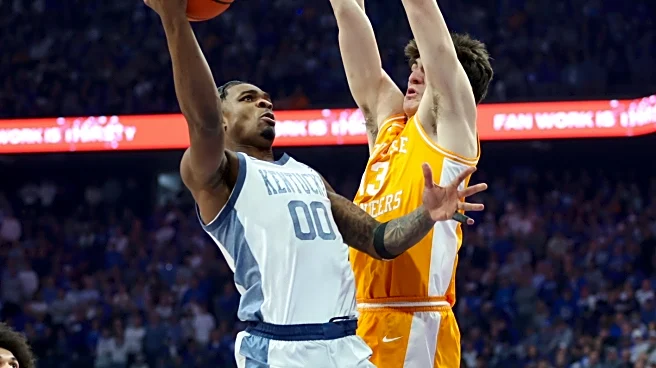What's Happening?
Brighton & Hove Albion's wage bill showcases a strategic approach to balancing experienced players with emerging talent. The club's financial commitments range from rewarding seasoned veterans to investing in promising young players. Carlos Baleba, the
lowest-paid player, earns £12,500 weekly, indicating Brighton's long-term vision for his development. Veteran goalkeeper Jason Steele receives £20,000 per week, reflecting his valued experience despite not being the first choice. Young talents like Stefanos Tzimas and Diego Coppola earn £20,000 and £25,000 weekly, respectively, highlighting Brighton's confidence in their potential growth. The club's wage structure also includes higher earners like Lewis Dunk and Kaoru Mitoma, who receive £80,000 weekly, underscoring their importance to the team's leadership and attacking prowess.
Why It's Important?
Brighton's wage strategy is significant as it demonstrates the club's commitment to sustainable growth and competitive performance in the Premier League. By investing in young players, Brighton ensures a pipeline of talent that can contribute to long-term success. The balanced wage structure allows the club to maintain financial stability while rewarding key players who drive team performance. This approach can attract emerging talents seeking development opportunities and experienced players looking for a stable environment. The club's ability to manage its wage bill effectively is crucial in maintaining competitiveness without overspending, which is vital in the financially demanding landscape of top-tier football.
What's Next?
Brighton is likely to continue its strategy of nurturing young talent while retaining experienced players to ensure a balanced squad. The club may focus on scouting and developing players who fit their system, potentially leading to more strategic signings. As the Premier League evolves, Brighton's wage strategy could serve as a model for other clubs aiming to balance financial prudence with competitive ambition. The club's ongoing investment in youth development may result in increased performance on the pitch, potentially leading to higher league standings and greater financial rewards.
Beyond the Headlines
Brighton's wage strategy reflects broader trends in football where clubs prioritize sustainable growth over short-term success. This approach aligns with ethical considerations of fair player compensation and long-term career development. By fostering a culture of growth and stability, Brighton contributes to the evolving landscape of football where financial responsibility and competitive integrity are increasingly valued. The club's focus on youth development also supports broader societal goals of providing opportunities for young athletes to succeed at the highest levels.
















